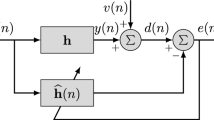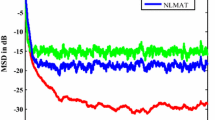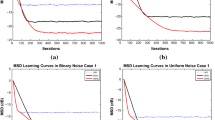Abstract
This work presents a unified performance analysis of the family of normalized least mean (NLM) algorithms under very weak assumptions. The key feature of the analysis is based on a recently proposed performance measure called effective weight deviation vector. The name is so given as it is the only component that contributes to the excess estimation error of the adaptive filter. Using this novel concept, both the steady-state analysis and the tracking analysis are presented with a unified framework for the whole family of the NLM algorithms. Thus, the derived results are valid for any normalized stochastic gradient algorithm minimizing 2pth power of the error where p is an integer value. The novelty of the analysis resides in the fact that it does not impose restrictions on the dependence between input successive regressors, the dependence among input regressor elements, the length of the adaptive filter, the distribution of noise, and filter’s input. Moreover, this approach is not limited to only small step-size value, and therefore, the analysis is valid for all the values of the step size in the stable range of the NLM algorithms. Furthermore, in this analysis, both stationary and non-stationary input signal and plant scenarios are considered. Consequently, asymptotic time-averaged convergence for the mean-squared effective weight deviation, mean absolute excess estimation error, and the mean-square excess estimation error for the NLM algorithm are established for both constant and time-varying plants. Finally, a number of simulation results are carried out to corroborate the theoretical findings.

Similar content being viewed by others
References
Sayed A.H.: Fundamentals of Adaptive Filtering. Wiley-Interscience, New York (2003)
Nagumo J.I., Noda A.: A learning method for system identification. IEEE Trans. Autom. Control 12, 282–287 (1967)
Zerguine A.: Convergence and steady-state analysis of the normalized Least Mean Fourth algorithm. Digit. Signal Process. 17(1), 17–31 (2007)
Bershad N.J.: Behavior of the \({\epsilon}\)-normalized LMS algorithm with Gaussian inputs. IEEE Trans. Acoust. Speech Signal Process. ASSP 35(5), 636–644 (1987)
Kolodziej, J.E.; Tobias, O.J.; Seara, R.: An improved stochastic model of the NLMS algorithm for correlated input data. In: EUSIPCO 2007 (2007)
Barrault G., Costa M.H., Bermudez J.C.M., Lenzi A.: A new analytical model for the NLMS algorithm. Proc. IEEE ICASSP 4, 41–44 (2005)
Al-Naffouri T.Y., Sayed A.H.: Transient analysis of data normalized adaptive filters. IEEE Trans. Signal Process. 51(3), 639–652 (2003)
Douglas S.C., Meng T.H.Y.: Normalized data nonlinearities for LMS Adaptation. IEEE Trans. Signal Process. 42(6), 1352–1365 (1994)
Bermudez J.C.M., Costa M.H.: A statistical analysis of the \({\epsilon}\)-NLMS and NLMS algorithms for correlated Gaussian signals. Revista da Sociedade Brasileira de Telecomunicaes 20(2), 7–13 (2005)
Haykin S.: Adaptive Filter Theory, 3rd edn. Prentice-Hall, Upper-Saddle River, NJ (1996)
Duttweiler D.L.: Adaptive filter performance with nonlinearities in the correlation multiplier. IEEE Trans. Acoust. Speech Signal Process. 30(4), 578–586 (1982)
Mathews V., Cho S.: Improved convergence analysis of stochastic gradient adaptive filters using the sign algorithm. IEEE Trans. Acoust. Speech Signal Process. 35(4), 450–454 (1987)
Bershad N.J.: On error-saturation nonlinearities in LMS adaptation. IEEE Trans. Acoust. Speech Signal Process. 36(4), 440–452 (1988)
Bershad N.J., Bonnet M.: Saturation effects in LMS adaptive echo cancellation for binary data. IEEE Trans. Acoust. Speech Signal Process. 38, 1687–1696 (1990)
Gibson J., Gray S.: MVSE adaptive filtering subject to a constraint on MSE. IEEE Trans. Circuits Syst. 35(5), 603–608 (1988)
Claasen T., Mecklenbräuker W.: Comparison of the convergence of two algorithms for adaptive FIR digital filters. IEEE Trans. Circuits Syst. 28(6), 510–518 (1981)
Gardner W.A.: Learning characteristic of stochastic-descent algorithms: A general study, analysis, and critique. Signal Process. 6(2), 113–133 (1984)
Rupp, M.: The behavior of LMS and NLMS algorithms in the presence of spherically invariant processes. IEEE Trans. Signal Process. 41(3), 1149–1160 (1993)
Koike S.: Convergence analysis of a data echo canceler with a stochastic gradient adaptive FIR filter using the sign algorithm. IEEE Trans. Signal Process. 43(12), 2852–2861 (1995)
Sharma R., Sethares W., Bucklew J.: Asymptotic analysis of stochastic gradient-based adaptive filtering algorithms with general cost functions. IEEE Trans. Signal Process. 44(9), 2186–2194 (1996)
Eweda E.: A new approach for analyzing the limiting behavior of the normalized LMS algorithm under weak assumptions. Signal Process. 89(11), 2143–2151 (2009)
Moinuddin, M.; Zerguine, A.: Steady-state analysis of the normalized least mean fourth algorithm without the independence and small step size assumptions. In: ICASSP 2009 (2009)
Author information
Authors and Affiliations
Corresponding author
Rights and permissions
About this article
Cite this article
Moinuddin, M., Zerguine, A. A Unified Performance Analysis of the Family of Normalized Least Mean Algorithms. Arab J Sci Eng 39, 7145–7157 (2014). https://doi.org/10.1007/s13369-014-1289-y
Received:
Accepted:
Published:
Issue Date:
DOI: https://doi.org/10.1007/s13369-014-1289-y




